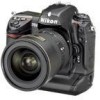Nikon D2H D2H User's Manual - Page 105
Electronic Analog Exposure Displays, Change Main / Sub
 |
UPC - 018208252084
View all Nikon D2H manuals
Add to My Manuals
Save this manual to your list of manuals |
Page 105 highlights
Taking Photographs-Exposure Non-CPU Lenses If the maximum aperture of the lens has been specified using the Non-CPU lens data item in shooting menu ( 124) when a non-CPU lens is attached, the current f/-number will be displayed in the viewfinder and top control panel, rounded to the nearest full stop. Otherwise the aperture displays will show only the number of stops ( , with maximum aperture displayed as ) and the f/-number must be read from the lens aperture ring. Electronic Analog Exposure Displays The electronic analog exposure displays in the top control panel and viewfinder show whether the photograph would be under- or over-exposed at current settings. Depending on the option chosen for Custom Setting b3 (EV step), the amount of underor over-exposure is shown in increments of 1/3 EV, ½ EV, or 1 EV. If the limits of the exposure metering system are exceeded, the displays will flash. "EV step" set to "1/3 step" "EV step" set to "1/2 step" "EV step" set to "1 step" Top control panel Viewfinder Top control panel Viewfinder Top control panel Viewfinder Optimal exposure Underexposed by 1/3 EV Underexposed by ½ EV Underexposed by 1 EV Overexposed by more than 3 EV* * At 1/3 step, appears in the viewfinder when overexposure exceeds 2 EV. b3-EV Step ( 184) This option controls whether changes to shutter speed and aperture are made in increments equivalent to 1/3 EV (the default setting), ½ EV, or 1 EV. d4-Long Exp. NR ( 190) To reduce noise at shutter speeds of about ½ s or slower, select On for Custom Setting d4. Note that this will increase the time needed to process photographs before they are saved to the memory card. f5-Command Dials ( 202-203) Command dials > Change Main/Sub and Command dials > Aperture setting control whether aperture is assigned with the main command dial, the sub-command dial, or the lens aperture ring. Regardless of the settings chosen, the command dials are always used with type G lenses, the lens aperture ring with non-CPU lenses. 93















